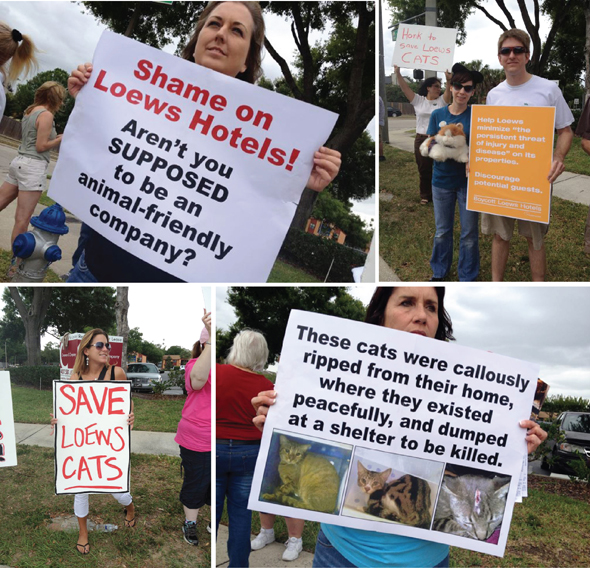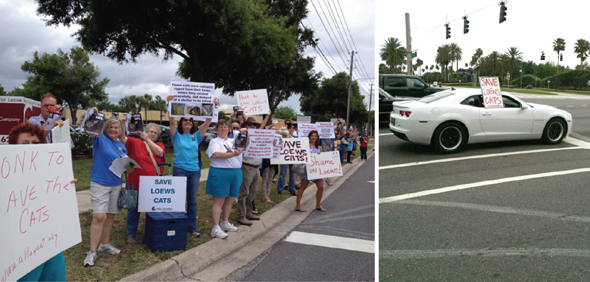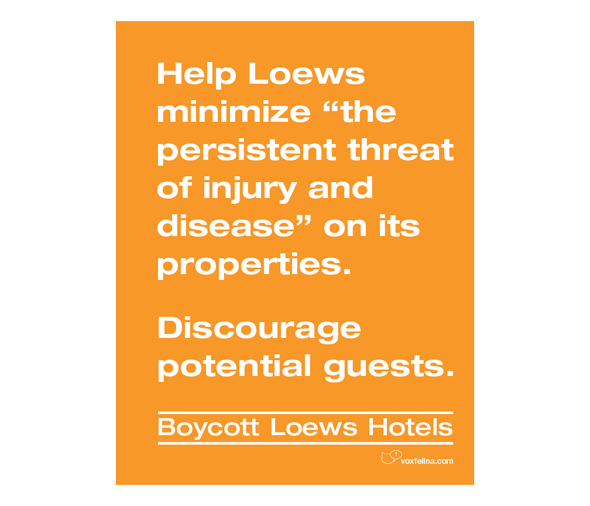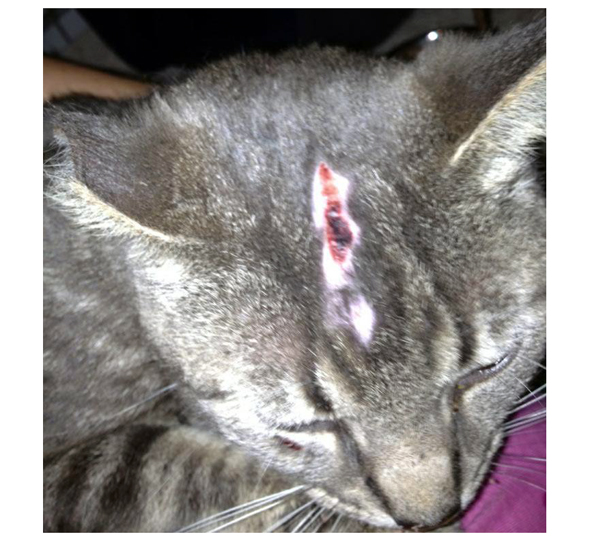Just as Loews began removing cats from their Portofino Bay Hotel and Royal Pacific Resort properties late last month, Shawn German, Regional Director of Human Resources, issued a memo outlining, among other things, the rationale for the decision and penalty for any members of the Loews “campus community” violating their no-feeding policy.
Not surprisingly, the focus is on the alleged public health threats posed by these sterilized, vaccinated, carefully monitored cats. The memo does not explain what prompted the recent policy reversal—again, no surprise.
What is a little surprising is what’s included in the Rationale section:
You might enjoy getting to know your furry friend but your neighbors might not, and may take action to eliminate the “pests.” Animals that become used to close interaction with humans become easy targets for people who do not respect wildlife and would hurt them intentionally. Also, there are many people who are afraid of wildlife and may injure an animal in an attempt to defend themselves against a mistaken “attack.”
Is Loews really suggesting that these cats are being removed for their own good? Recent events certainly suggest otherwise—indeed, that very little consideration has been given to the treatment and care of the cats that have been trapped. And it’s been nearly two weeks since the remaining cats (six or so, by my count) have been fed.
It’s clear at this point that the greatest threat to these cats is Loews management.

Date: March 27, 2012
To: LHUO Subcontractors, Vendors, Tenants and/or Business Partners
From: Shawn German, Regional Director of Human Resources
Subject: Animal Feeding and Handling Policy
Whether you are a subcontractor, vendor, tenant and/or business partner of Loews Hotels at Universal Orlando (LHUO) you are considered to be members of our “campus community”. As such, we urge you to please review the attached policy and ensure that all of your employees understand and follow this new policy. The health and safety of our guests, team members, vendors and visitors must be a priority.
We have completed a thorough and objective assessment of the feral, free-roaming cats on hotel property and are working closely with Orange County Animal Services, where the cats will be taken. There are many challenges that arise from maintaining free-roaming, feral cats in our hotel environment. Specifically, when the feral cats get into guest contact areas, it creates safety issues for both guests and team members, as well as health Issues. The outdoor feeding of animals attracts other wild and feral species, which can facilitate the spread of disease from rabies vectors such as raccoons. While our hotels are pet-friendly, there are important distinctions between owned pets and feral, undomesticated animals.
The Florida Department of Health’s position states: “The concept of managing free-roaming, feral domestic cats is not tenable on public health grounds because of the persistent threat posed to communities from injury and disease. While the risk for disease transmission from cats to people is generally low when these animals are maintained indoors and routinely cared for, free-roaming cats pose a continuous concern to communities.”
It is important for you to know that we have researched and evaluated all aspects of this issue and believe we must take these steps in the interest of the health and safety of our guests, team members and members of our “campus community”. If you have any questions or concerns, please contact your respective Hotel General Manager or the Regional Executive Offices for LHUO.
MANAGER POLICY MANUAL
POLICY# 7225
SUBJECT: ANIMAL FEEDING & HANDLING POLICY
Policy:
I. INTRODUCTION
The ability to control the feral and undomesticated wild animal population on our campus property is always a concern and priority for us at Loews Hotels at Universal Orlando (LHUO). In an effort to reduce the community’s health risk from contact with these animals, the following policy has been adopted. Feral and undomesticated wild animals are potential carriers of rabies and other diseases, which may infect a person if bitten and/or scratched. This policy intends to raise awareness and reduce conflict with feral and undomesticated wild animals; therefore reducing the risk of contracting animal borne diseases. LHUO team members, vendors, contractors, suppliers and business partners are prohibited from leaving food or water on campus grounds for the purpose of feeding animals. The practice of leaving food stuff outdoors creates attraction of undesirable wild and feral species, which in turn creates the health risk. Any food found outside on LHUO grounds will be promptly removed and disposed of. The person(s) identified as feeding the animals will be informed of the “No Feeding Policy”, and may result in disciplinary action.
All trash dumpsters, in which food may potentially be disposed of, are to be kept clean and covered at all times.
In addition to our “No Feeding Policy” it is also a violation of this policy for any LHUO team member to handle or engage in any physical contact with any feral and undomesticated wild animals found on LHUO grounds. The “No Handling” aspect of this policy is equally important to ensure that no members of our “campus community” are injured by coming into contact with these animals and to rely on experts who are trained and best capable in handling these animals in a safe and humane manner. *
All members of the LHUO “campus community” are required to comply with all aspects of these policies and are responsible for reporting incidences of non-compliance. Any guests that are found to be feeding and/or handling these animals should be asked to comply with this policy as well.
Any incident involving a feral undomesticated wild animal should be reported to the Safety/Security Department. The handling and/or removal of these animals will be handled by the following:
Safety/Security and Engineering personnel, Orange County Animal Control, Florida Fish and Wildlife and/or other representatives designated by LHUO Management.
II. PURPOSE
The purpose of this animal feeding and handling policy is to:
- reduce the risk of injury to LHUO guests, team members, visitors and members of our “campus community”
- reduce and/or eliminate contact with these animals which either annoy or endanger the comfort, health or safety of LHUO staff and/or these animals;
- avoid potential health hazards;
- and to prevent damage to LHUO buildings and grounds.
This policy applies to all LHUO staff.
III. DEFINITIONS
Wild Animal – A feral animal that is wild by nature and is not normally considered domesticated includes, but is not limited to, the following: squirrels, ducks, pigeons, raccoons, possums, snakes, birds, alligators, rats, and stray cats and dogs.
Feed – Any material that can be utilized for consumption by wild animals.
Feeding – The feeding, spreading, casting, laying, depositing, throwing, placing, leaving or dumping of food.
LHUO Campus Community – This includes LHUO team members, vendors, suppliers, contractors, business partners, guests and visitors of LHUO.
IV. POLICY
Feral and/or undomesticated wild animals are prohibited in any LHUO building. This includes, but is not limited to, administrative offices, hotels, tents, food & beverage outlets, and all on-campus structures.
Owned pets may be brought onto campus, but shall be appropriately restrained and/or contained at all times by the responsible owner.
Dogs must be on a leash or chain that does not exceed 6 feet in length and that is in the hands of a responsible owner/custodian.
Other pets may also be allowed on campus, but only in an appropriate cage, carrier, crate, or kennel.
Animals may not be tethered unattended, or abandoned on LHUO property.
Animals may not be left unattended in any vehicle parked on LHUO property.
Animals brought on campus must be appropriately inoculated for rabies, with the burden of proof on the responsible owner/custodian.
When animals are brought on LHUO property, the responsible owner/custodian shall be responsible for feeding and cleaning up after the animal. This includes any fecal material deposited by the animal while on campus.
LHUO, in its sole discretion, reserves the right to request that any animal(s) creating a nuisance be removed from campus property and further reserves the right to prohibit animals from any Hotel/Resort event.
LHUO is not responsible for any animal brought onto LHUO property.
The feeding and/or handling of feral and undomesticated wild animals on or around LHUO grounds is not permitted because:
- It establishes a potential risk of injury to our Team Members, members of our “campus community”, LHUO guests and visitors;
- creates or fosters a congregation or congestion of wildlife;
- establishes the potential conflict with domesticated pets staying with registered guests of LHUO;
- creates an accumulation of droppings on surrounding properties;
- causes actual or potential property damage or disfigurement, or degrades scenic attractiveness;
- has the possibility to attract rodents and other vermin;
- interferes with the enjoyment of LHUO facilities;
- is potentially unhealthy for the particular species, or causes undue distress or conflict for the animal being fed;
- and it increases the likelihood of diseases being spread from animals to other animals and to humans.
In addition, no LHUO team member shall knowingly leave or store any feed in a manner that would constitute a lure, an attraction or an enticement of feral and undomesticated wild animals.
V. PENALTY
Any LHUO team member that engages in the feeding or handling of feral undomesticated wild animals will be subject to disciplinary action.
VI. RATIONALE
OVERPOPULATION An abundance of food can lead to a population increase that the natural food supply cannot support. This can then lead to starvation and disease.
LOSS OF FEAR OF HUMANS Nuisance wildlife problems are often caused by those animals that have lost their natural fear of humans. Property damage and unwanted “houseguests” are often the result. You might enjoy getting to know your furry friend but your neighbors might not, and may take action to eliminate the “pests.” Animals that become used to close interaction with humans become easy targets for people who do not respect wildlife and would hurt them intentionally. Also, there are many people who are afraid of wildlife and may injure an animal in an attempt to defend themselves against a mistaken “attack.”
DISEASE Stress from competition for food, and an inadequate diet can increase the susceptibility of individual animals to diseases and parasites. Some wildlife diseases can be transmitted to other animals and humans.
INJURY RISK Wild animals do not understand that you are trying to be their friend by feeding them. They may misinterpret your actions and injure you. There is no guarantee that a wild animal knows where the food stops and your fingers begin. Bites can also cause substantial injury, trauma and disease.
UNNATURAL INTERACTIONS BETWEEN WILDLIFE Feeding can cause injuries and harmful interactions between wildlife species that would normally forage separately, by often bringing incompatible, competitive or even natural enemies together.
LHUO recognizes it is our responsibility to provide a safe environment for our guests, team members and visitors and to seek assistance to have any feral undomesticated wild animals removed from LHUO property when necessary.
* Sections of this policy may not apply to designated personnel as determined by the management of LHUO)
Issued: 3/28/2012 Revised: 3/27/2012
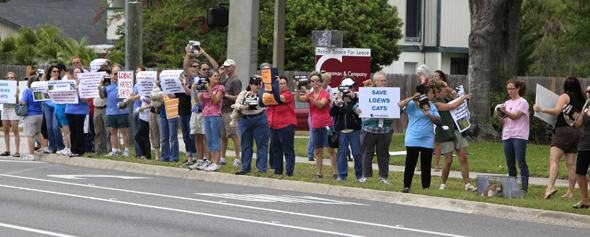 Photo courtesy of Alley Cat Allies.
Photo courtesy of Alley Cat Allies.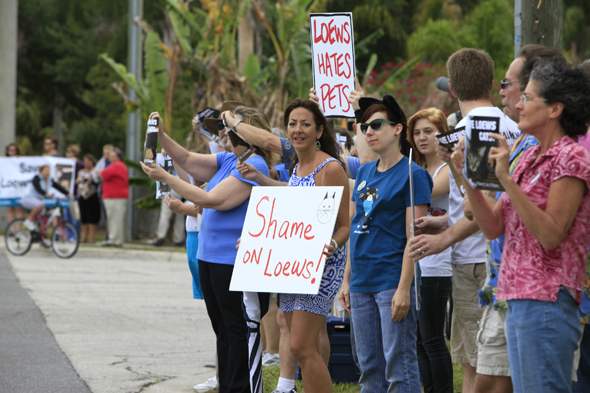
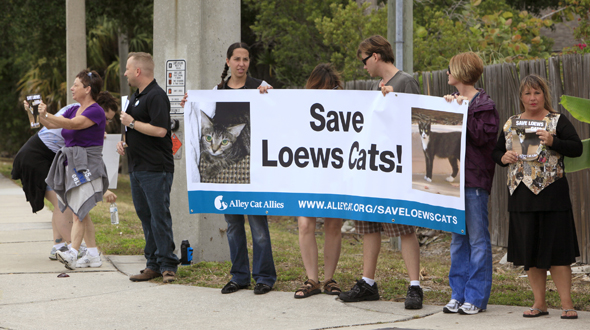
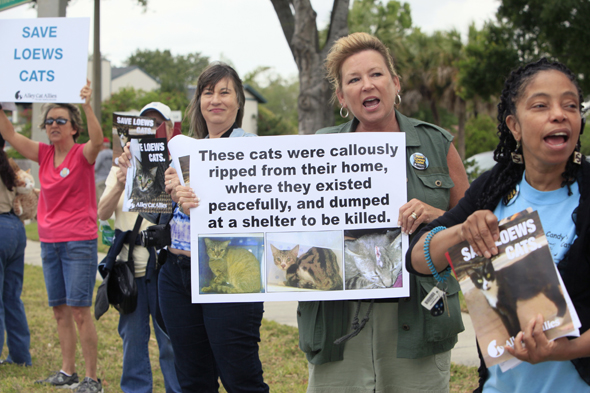
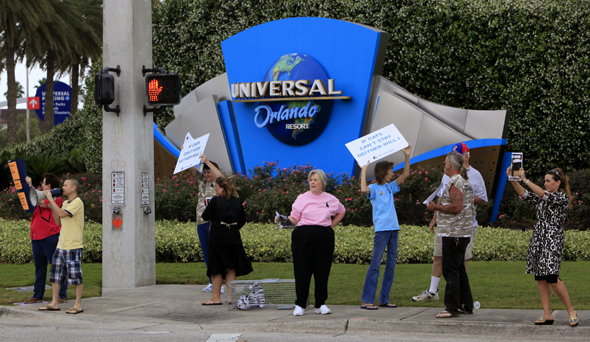 Photos courtesy of Alley Cat Allies.
Photos courtesy of Alley Cat Allies.